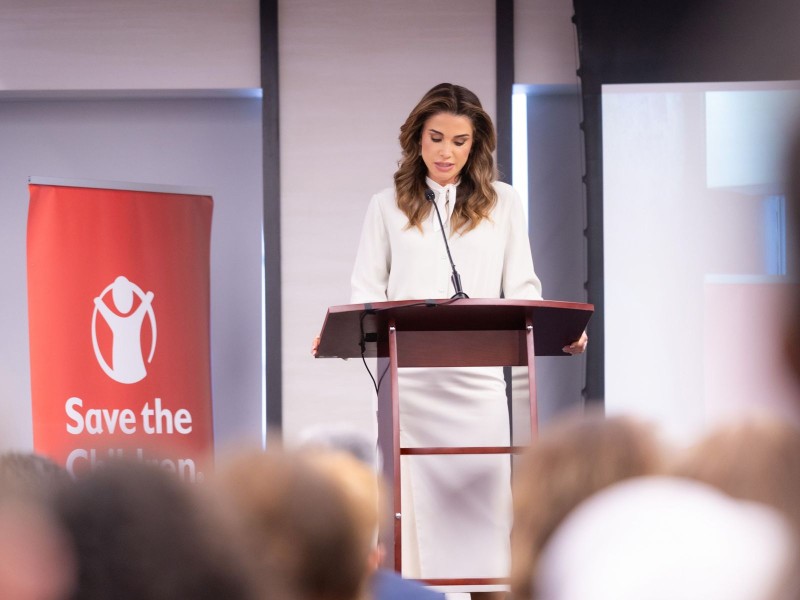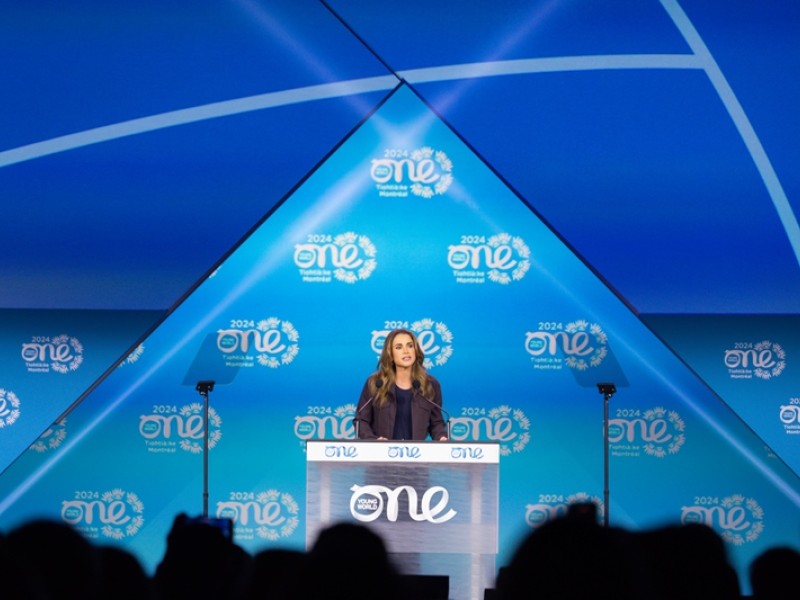Queen Rania's Acceptance Speech for the Andrea Bocelli Humanitarian Award - Florence, Italy
Dear Andrea, if you’ll allow me, on behalf of the people of Jordan, I’d like to begin by expressing my condolences to the people of Italy for those who perished in last month’s earthquake in Amatrice. And, know that we stand in solidarity with all of Italy as the difficult process of rebuilding begins. But rebuild you will – as you will heal.
And, now, back to this evening.
It’s a pleasure to return to one of my favorite cities in the world to receive this award. And receiving it from you makes it all the more special. Because, your example - your values, and generous spirit -- inspire me and all of us to work harder for those most in need.
With love and justice at the heart of the work of your foundation, you remind us all of the power – and the potential -- of our common humanity. The chorus of children’s voices in Haiti – uplifted through music therapy – are testament to that.
Love and justice are also at the heart of the important work to which Muhammad Ali dedicated his life. His courage and determination, even as he suffered, have helped to keep Parkinson’s at the forefront of medical research efforts. And I’m so grateful that Lonnie is here to help us honor him and continue the legacy of The Champ.
I said a moment ago that Florence was one of my favourite cities in the world. That’s because she is so much more than just a beautiful city. She’s the cradle of the Renaissance. That watershed moment in our shared history that redefined how we relate to art, music and culture. A time when art – and artists – were celebrated for how they expressed the beauty of the natural world, and man’s place within it. When musicians transformed the way they composed and communicated their music. And when designers simultaneously channeled and challenged influences from classical times to create the outstanding architectural splendor we see around us today.
The Renaissance, was an age of flourishing but it was also an age of chaos. Yet people persisted; they built beauty and achieved breakthroughs that we still know and celebrate, over five hundred years later. It was a time of profound transformation…and progress. Of darkness into light. A period which shaped the early modern world and for which we will forever be indebted.
The question we must ask ourselves as we navigate the crises of our times, is what will shape our world today? What will our legacy be?
The stakes could not be higher. Right now, there are forces at work – in Syria, Iraq, South Sudan, Nigeria and beyond -- determined to drag us back to the Dark Ages. Intimidated by our progress, they want us to live in a world of black and white where the only color is the red of bloodshed. They want to silence the universal language of music and the healing sound of song. And, as we’ve seen, all too often, their priority upon seizing an area is to destroy its heritage, art, any sign of civilization – from the historic city of Palmyra in Syria to Iraq’s ancient Assyrian city of Nimrud.
They have declared war on all of civilization but perhaps their most painful attack is that on the innocence of childhood. Like Omran Daqneesh.
You remember Omran. The five year old rescued, last month, from the rubble after an airstrike in Aleppo, Syria. He sat in the back of an ambulance, dusty, dazed, and shell-shocked. So deeply traumatized, that not even the sight of his own blood fazed him. His silence screamed at the world. And the world had few words to offer back.
Is this our legacy for future generations? Civilizations in ruin, and childhoods buried forever under the rubble of war and indifference?
I think not.
Ladies and gentlemen,
Hundreds of years ago, this month, Michelangelo’s David was first unveiled just a few steps from here. The pose of Michelangelo's sculpture was unlike that of earlier depictions of the young warrior, triumphant over the slain Goliath. Instead, he chose to depict David just before the battle; his brow drawn, his eyes focused. He captured him in that decisive moment between realizing what he must do and summoning the courage to do it. That split second between conscious choice and action.
We are in that moment… and our world desperately needs a new Renaissance, that drives humanity to give its best just when the stakes are highest. To act, not hesitate. To reach out, not retreat. To create and celebrate beauty – not only for its own sake but for the sake of humanity. For in celebrating beauty, we celebrate progress and perseverance. We counter the ugliness of those forces that seek to wreak havoc on us. And we re-energize our shared instinct for common decency and compassion. The instinct that sees us stand up for the downtrodden, and speak out for those whose voices are silenced. You know that instinct well. It is what brings you here this evening and guides your daily lives.
So, tonight, as we applaud the power of the human spirit, let us invoke the courage and vision of our forbearers here in Florence. Let us honor the beauty that Andrea brings to the world every day, through his music and his tireless work. And let us, together, across our diverse backgrounds and cultures, define a legacy that the world will still celebrate half a millennium from now.
Thank you all very much.
-------------------------------------------------------------------------------------------------------------
Italian translation:
Caro Andrea, a nome del popolo della Giordania, desidero innanzi tutto esprimere le mie condoglianze al popolo italiano per coloro che sono periti nel terremoto del mese scorso ad Amatrice. Sappi che siamo solidali con tutta Italia ora che inizia il difficile processo di ricostruzione. Ma sono certa che l’Italia saprà ricostruire – e potrà guarire.
Ed ora torniamo a questa sera
E’ un piacere tornare a una delle mie città preferite al mondo per ricevere questo premio. E riceverlo da te rende il tutto ancora più speciale. Questo perché, il tuo esempio - i tuoi valori e il tuo animo generoso –spronano me e tutti noi a lavorare di più per coloro che ne hanno più bisogno.
Con l’amore e la giustizia al centro del lavoro della tua fondazione, tu ci ricordi tutto il potere - e il potenziale – della nostra comune umanità. Il coro di voci dei bambini ad Haiti – consolati e rinforzati attraverso la musicoterapia – è testimonianza di questo.
L'amore e la giustizia sono anche al centro del lavoro importante al quale Mohammad Ali ha dedicato la sua vita. Il suo coraggio e la sua determinazione, anche nella grande sofferenza, hanno contribuito a mantenere il Parkinson in prima linea negli sforzi della ricerca medica. E io sono così grata che Lonnie sia qui per aiutarci a onorarlo e continuare l'eredità del Campione.
Ho detto poco fa che Firenze e' una delle mie città preferite al mondo. Questo perché essa è molto di più che semplicemente una bella città. Firenze é la culla del Rinascimento. Quel momento come spartiacque della nostra storia comune ha ridefinito il nostro approccio con l'arte, la musica e la cultura. Quello fu il tempo in cui l'arte - e gli artisti - sono state celebrati per il modo in cui hanno rappresentato la bellezza della natura, e il posto dell'uomo in essa. Fu quando i musicisti hanno trasformato il modo di comporre e comunicare la loro musica. E quando i progettisti simultaneamente hanno incanalato e sfidato le influenze di epoca classica per creare l'eccezionale splendore architettonico che vediamo intorno a noi oggi.
Il Rinascimento, fu un'epoca di fioritura ma fu anche un'epoca di caos. Eppure la gente di quell’epoca non cambiò indirizzo; essi costruirono la bellezza e realizzarono scoperte che ancora conosciamo e celebriamo, più di cinquecento anni dopo. Fu un momento di profonda trasformazione ... e progresso. Di oscurità che si fa luce. Un periodo che ha plasmato il mondo moderno in anticipo e per il quale noi dovremo sempre sentirci riconoscenti.
La domanda che dobbiamo porci nel navigare la crisi dei nostri tempi, è cos’é che oggi forma il nostro mondo? Quale sarà la nostra eredità?
La posta in gioco non potrebbe essere più alta. In questo momento, ci sono forze al lavoro - in Siria, Iraq, Sud Sudan, Nigeria e oltre - determinate a trascinarci in Secoli Bui. Minacciati da nostri progressi, vogliono farci vivere in un mondo di bianco e nero in cui l'unico colore è il rosso del sangue. Vogliono mettere a tacere il linguaggio universale della musica e il potere curativo di suoni e canzoni.
E, come abbiamo visto, troppo spesso, la loro priorità nell’aggredire un'area è quello di distruggere il suo patrimonio culturale, la sua arte, ogni segno di civiltà - dalla storica città di Palmyra in Siria all’ antica città assira dell'Iraq di Nimrud.
Essi hanno dichiarato guerra a tutta la civiltà, ma forse il loro attacco più doloroso è quello all'innocenza dell'infanzia. Come Omran Daqneesh.
Vi ricordate di Omran. Il bimbo di cinque anni salvato, il mese scorso, dalle macerie dopo un attacco aereo ad Aleppo, in Siria. Sedeva nel retro di un'ambulanza, tutto impolverato, stordito e sotto shock. Così profondamente traumatizzato, che nemmeno la vista del proprio sangue lo turbava. Il suo silenzio gridato al mondo. E il mondo ha avuto poche parole con cui rispondere.
È questa la nostra eredità da lasciare alle generazioni future? Civiltà in rovina, l’infanzia sepolta per sempre sotto le macerie di guerra e indifferenza?
Io credo di no.
Signore e signori,
Centinaia di anni fa, in questo mese, il Davide di Michelangelo fu svelato a pochi passi da qui. La posa della scultura di Michelangelo era diversa da quella delle precedenti rappresentazioni del giovane guerriero, trionfante sul Golia ucciso. Invece, Michelangelo scelse di raffigurare Davide appena prima della battaglia; la fronte corrugata, gli occhi concentrati. Michelangelo lo ha catturato nel momento decisivo tra il rendersi conto di quello che doveva fare e il richiamo del coraggio per farlo. Quella frazione di secondo tra la scelta consapevole e l’azione.
Siamo in quel momento ... e il nostro mondo ha disperatamente bisogno di un nuovo Rinascimento, che spinga l'umanità a dare il meglio proprio quando la posta in gioco é più alta. Agire, non esitare. Venirsi incontro, non tirarsi indietro. Creare e celebrare la bellezza - non solo per se stessa ma per il bene dell'umanità. Perché esaltando la bellezza, si esaltano il progresso e la tenacia.
Dobbiamo contrastare la bruttezza di quelle forze che cercano di devastarci. E ridare energia al nostro istinto per il comune decoro e comunanza di sentimenti. L'istinto che ci vede combattere per gli oppressi, e parlare in vece di coloro che sono stati messi a tacere. Conoscete bene quell’ l'istinto. E 'quello che vi ha portati qui questa sera e che guida la vostra vita quotidiana.
Così, questa sera, come noi applaudiamo il potere dello spirito umano, invochiamo il coraggio e la visione dei nostri antenati qui a Firenze. Onoriamo la bellezza che Andrea porta al mondo ogni giorno, attraverso la sua musica e il suo lavoro instancabile. E facciamo in modo, attraverso le nostre diverse origini etniche e culturali, di definire un’eredità che il mondo ancora possa celebrare per mezzo millennio a partire da oggi.
Grazie.
Featured
Queen Rania's official website
This website does not support old browsers. To view this website, Please upgrade your browser to IE 9 or greater
Your browser is out of date. It has known security flaws and may not display all features of this and other websites. Learn how to update your browser



